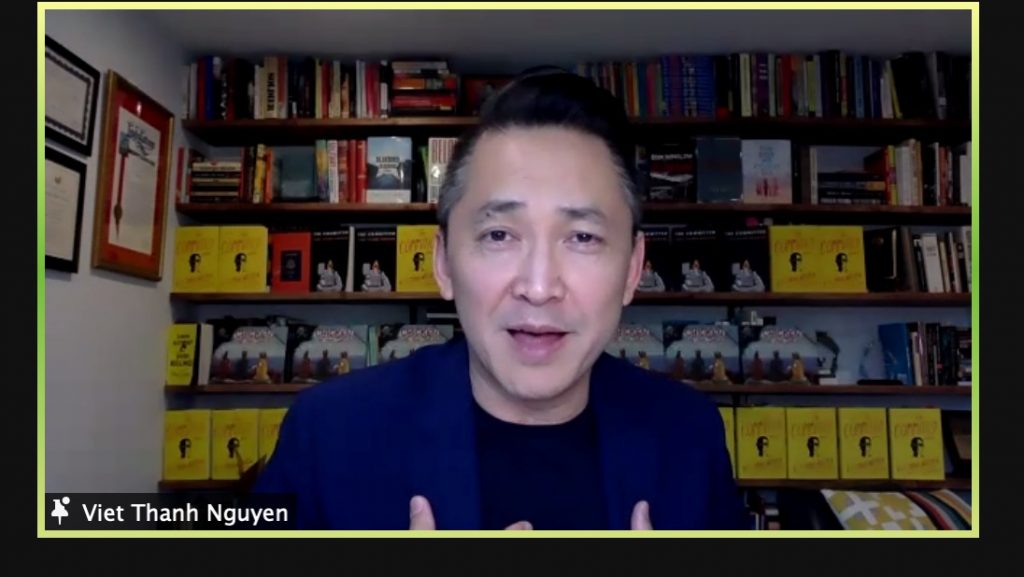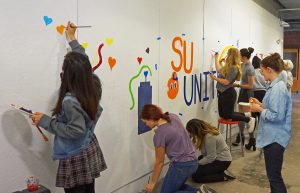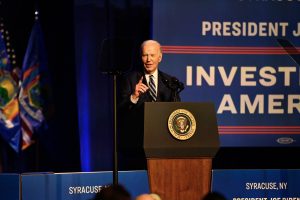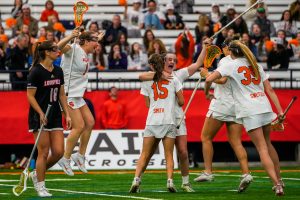Novelist shares importance of lifting Asian-American, refugee voices
Novelist shares importance of lifting Asian-American voices

When award-winning novelist Viet Thanh Nguyen first watched the Vietnam War film Apocalypse Now at around 12 years old, it was the first time he saw his two identities clash on screen.
Nguyen, who became a Vietnamese refugee when he and his family fled to the United States in 1975, watched as American soldiers in the film killed Vietnamese people. Because he identifies as both American and Vietnamese, seeing that film caused him to question who he really was.
“I really felt myself split in two,” Nguyen told a Syracuse University audience Tuesday night.“Was I the American doing the killing or was I the Vietnamese being killed?”
Nguyen, a Pulitzer-Prize winning novelist, discussed misrepresentation he’s endured as a Vietnamese refugee in America and his novel The Sympathizer as part of the University Lectures series. SU English professor Dana Spiotta moderated the discussion.
During the hour-long Zoom lecture, Nguyen discussed how he experienced long-distance racism through American pop culture. Growing up in San Jose, California, he relied mostly on Hollywood movies and books as well as his parents’ stories to learn about the Vietnam War. He later found these works only contained American perspectives that demeaned Vietnamese people.
“Pop culture is so powerful and shapes all of us, especially if you happen to be a minority of some kind,” Nguyen said. “You’re faced with this overwhelming world of representation where you are not represented, or you are misrepresented, and it can be really, really painful.”
The University of Southern California professor and Los Angeles Times critic is best known for his 2015 debut novel, The Sympathizer, a story about a double agent that takes place during the Vietnam War. The novel won the Pulitzer Prize, the Dayton Literary Peace Prize and was a finalist for the PEN/Faulkner Award. His follow-up book The Committed will be published this year.
Nguyen said his goal for The Sympathizer was to make Vietnamese perspectives heard, especially since Hollywood fails to include those narratives. He said since American people rely on those stories to remember the war, it is important to include all sides.
“If the novel works for you. If you’re immersed in the story, the narrative, and you feel great sympathy, hopefully, the empathy for the characters and it should force you to think twice about the received narratives that you have,” he said.
Nguyen said hearing the injustices that his parents experienced as refugees and victims of colonialism was part of the reason he gravitated towards activism. Through his work, whether it’s an opinion piece or fictional story, he hopes to show people that his parents’ experiences are not unique and are part of marginalized groups.
“Those of us who become activists, I think, see that what our parents went through was shared by many other people, and not just people in their own community, but people in other groups as well,” he said.
Nguyen advised students who also have refugee parents to be empathetic and educate themselves about their parents’ history as best they can. He said learning about his parent’s history and their experiences in Vietnam is a lifelong process that required him to research the years around 1975 to fill in the blanks of their stories.
During the lecture, Nguyen also addressed the increase in verbal and physical violence against the Asian American community since the coronavirus pandemic began.
He said to solve the issue, the community must have the resources to defend themselves and America must hold the right people accountable. He said some people in power are responsible for inciting anti-Asian racism by labeling the coronavirus as the “China flu,” but were never held accountable.
“We really need to have the structural awareness of how anti-Asian violence works in this country,” he said. “It’s not just the person who pulls the knife or spits on you, that’s responsible. It’s the upper powers who want these divisions to happen and will use it to foster divisions in our country.”
Nguyen said America needs to do more than publish the works of Asian-American authors to combat racism. Instead, every professional in every field needs to do a “forensic analysis” of how brutal history has been embedded in our everyday lives and consider ways to address it, he said.
“It’s really crucial for us who are writers and working professionals in the publishing industry to be aware that just because you give someone like me a Pulitzer Prize, ‘thank you,’ but it doesn’t address the fundamental inequalities.”








